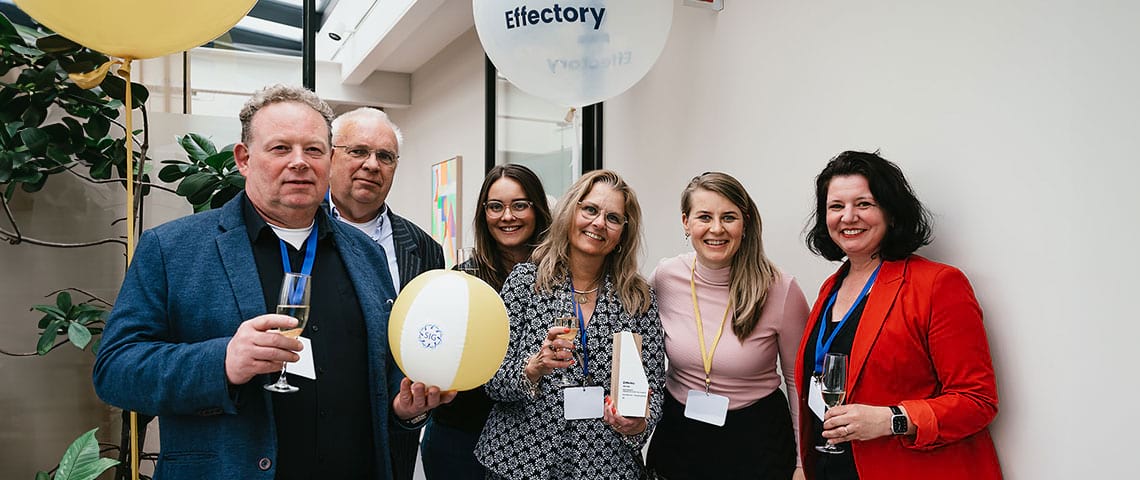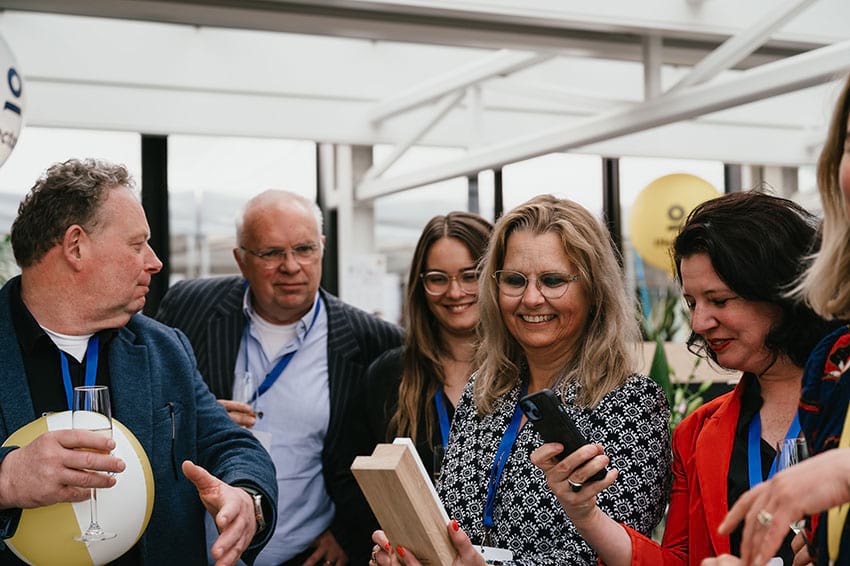For the second consecutive year, SIG ranks among the Netherlands’ top employers. Distinguishing themselves as excellent employers in disability care, the NGO has earned the World-class Workplace 2024 award. SIG is a top employer in an industry that currently faces many challenges.
SIG beats the benchmark of employer excellence in disability care

The organization’s mission is to enhance the independence and quality of life for individuals with disabilities and/or autism. They achieve this by supporting them in their daily lives and activities through a range of services including residential care, community support, and day programs.
To support its staff in this mission, SIG has implemented a dedicated approach prioritizing both the client and the employee needs at the core of its operations.
Astrid Reulen, Cluster Manager of Organizations, and acting director at SIG, made significant contributions to Effectory’s World-class Workplace event on April 18th. During HR-History sessions, Astrid shared insights and strategies to effectively address urgent challenges in healthcare, such as retention and workload management.
Sign up for World-Class Workplace
A reward for good employers, because good employment practices deserve recognition. A fair quality mark, 100% based on the opinion of employees.
Sign upRaising the bar: How SIG surpasses industry benchmarks
Who the winners of the World-class Workplace award are becomes clear upon an independent survey conducted by Effectory.
In the World-class Workplace survey, SIG achieved an employer score of 8.0 (on a scale of 1-10), surpassing the benchmark of 7.2. This score underscores the importance of employee feedback in providing the right support.
Recognition as a World-class Workplace is a direct result from positive employee feedback.
It’s crucial that when you conduct an employee survey, you visibly act on it and show that employees have an influence
“It’s crucial that when you conduct an employee survey, you visibly act on it and show that employees have an influence. After all, control is something we all want. Our employees handle 95 percent of the decision-making about how their work is structured—they are the professionals. However, we provide support for the conditions they work under. It is like a relationship—you must keep working at it to ensure it functions,” Astrid explains.
To achieve this, SIG championed various challenges with the help of employee feedback. The organization has learned what drives its employees by actively measuring and adjusting. Team leaders at SIG know what employees need to feel comfortable and safe at their workplace.

3 strategies to overcome challenges in the healthcare industry
The challenges faced by SIG are inherent to the healthcare sector. Like other organizations, SIG meets the complexities of diverse employee needs, managing high workload, and addressing turnover among other industry-wide issues.
1. Proactive and supportive leadership
To minimize workload and reduce turnover, SIG has developed a management style that emphasizes proactivity and support. Cluster managers and team leaders work closely with their teams, predicting potential stressors to actively offer solutions. “We have a ‘doers’ booklet where the pillars are concretely outlined. This is language we all share—and language is particularly important,” says Astrid.
2. Focus on employee development and resilience
SIG consistently invests in the well-being and professional growth of its employees. By investing ‘upfront’ through training, support, and proper technological tools, the organization reduces the likelihood of ‘backend’ issues such as burnout and high turnover. This not only improves employee satisfaction but also ensures continuity and quality of care.
3. A generation-conscious policy
SIG recognizes the diversity within its workforce, where three different generations have various expectations and needs. To address this, the foundation adopts a generation-conscious approach. For instance, younger employees might be approached with digital tools and video training, while more traditional methods are supported for older employees.
This cross-pollination policy strengthens team dynamics, fosters collaboration, and contributes to an inclusive organizational culture. Employees more skilled in technology might support colleagues who may have more experience in client-focused skills or administrative tasks.
“By pairing people who can complement each other, we not only strengthen the team dynamics but also optimize the care we provide. It’s about seeing what everyone can bring to the table, and how it helps the team. This constructive collaboration is what sets us apart,” says Astrid.

The benefits of a people-centric approach for retention
The strategies implemented by SIG have led to an average employee satisfaction score of 8 out of 10. This reflects the effectiveness of a workplace that prioritizes the needs of its clients and employees. Engagement is a key KPI for predicting retention as satisfied employees tend to stay significantly longer with their organization.
A people-centric approach ensures that employees feel they can rely on their colleagues for aid. Employees find their work meaningful, with a score of 8.9 for meaningful work, contributing to their pride in what they do at SIG, rated at 8.7.
This shows that SIG’s leadership is involved, setting a standard for other organizations in the healthcare sector to follow.
Engaged leadership inspires employees
When employees are satisfied, proud, and feel they have a voice, they are more likely to engage with the organization and its vision. Employees at SIG support the organization’s vision, which is reflected in a score of 8.6.
Increased employee engagement can lead to a reduction in turnover, which in turn lowers recruitment and training costs and ensures a stable work environment. Moreover, it fosters a company culture where employees feel valued and recognized for their contributions, which is crucial in a sector where emotional burdens can be high. Engaged and compassionate leadership is essential to achieve this.
A significant outcome of engaged leadership is the reduced workload, allowing employees to experience a healthier work-life balance. This is achieved through the proactive approach of management to detect and resolve issues before they escalate.
We ensure that whether there’s something to celebrate or difficult situations arise, we are there. That’s the feedback we get from relatives, employees hear it, and they are proud.
“We ensure that whether there’s something to celebrate or difficult situations arise, we are there. That’s the feedback we get from relatives, employees hear it, and they are proud. That’s really something you can plan. The only thing is, you cannot have a 9 to 5 mentality,” Astrid notes.
Furthermore, the organization measures higher engagement. They offer clear communication channels and provide platforms for employees to voice their opinions, contributing to the feeling of being heard and valued.
Do you want to create a World-class Workplace?
Just as SIG sets the standard for employer excellence in disability care, your organization can become an inspiring example for other organizations to create a supportive and inclusive work environment.
Are you the next top employer in your industry? Learn how to become a World-class Workplace.
Book a free demo. See our solutions in action.
Effectory is Europe’s Leading provider of Employee Listening Solutions. Schedule a product demo and discover how to enhance your employees’ engagement.
Demo request
